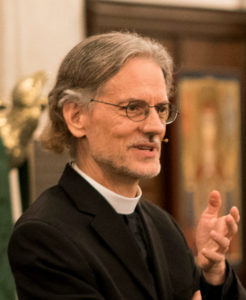The Optimism of Adam
When ashes are imposed at the beginning of Lent various words are spoken, but the traditional ones are “Remember, O man, that dust thou art, and unto dust shalt thou return.” These reach back to the first human being, the Adam, into whom God breathed life after forming him from dust. When we hear those Ash Wednesday words, you and I become Adam, the “man,” made of dust. We remember where we come from.
This origin story is told in Genesis 2. In the next chapter we find the story of the fall. The woman, formed by God from the original Adam, falls for the serpent’s deception that, if they ignore God’s prohibition and eat of the fruit of the tree of knowledge, she and Adam will become like God. Reckoning that it would be good to be the same as God, she eats the fruit. Then Adam, without hesitation, does the same.
When God articulates the consequences, Adam hears that they will fall most heavily upon himself. But before turning to Adam, God tells the woman that she will suffer pain in giving birth to children. Then he tells Adam how hard his life is going to be, and that in the end he will die. Death is described by God as returning to the dust from whence Adam came: “unto dust shalt thou return.”
This sounds like bad news—and it is—but what is remarkable is how Adam responds. Though he has just been told by God that he is going to die, he seizes upon an implicit bit of good news: God said there would be childbirth. While telling the woman she would experience pain, it was at the same time God’s announcement that she would give birth.
Here’s the point: Although Adam now knows he is on the mortal path back to dust—the path to death—he also knows that there will be children. Because of this, he is moved now to give a name to the woman; he calls her “Eve,” because she is “the mother of all living.”
Robert Sacks, in his book The Lion and the Ass: Reading Genesis after Babylon, calls Adam a fundamentally optimistic fellow. In the midst of God’s pronouncement of their doom, Adam seizes upon a kernel of good news: There will be children, hundreds and thousands and millions of children—uncountable, all the people who will ever live—and the mother of all of them is Eve. Adam looks at Eve and sees the matrix of the human race.
I draw two strong inferences from this story of the optimistic Adam. The first is that divisions in the human race are intrafamilial divisions. Perhaps we should stop speaking of “races” and insist instead that there is only the human race. Each one of us is descended from an original Eve. This claim, incidentally, seems to have philosophical and scientific grounding. William Lane Craig, for example, gives it serious attention in his new book, In Quest of the Historical Adam, which has recently generated much interest among evangelical theologians.
Second, as we see in the Genesis account, children are a primordial means for bringing happiness into a world saddened by death. From the beginning, their birth has been greeted with joy. My then-three-year-old granddaughter was at my wife’s funeral, standing between her father and myself. At one point, as we adults knelt, she put a hand on each of our backs. Her gesture was seen by many people in the church who later remarked upon it to me. What did it mean? What might she have understood? It seemed and felt deeply mysterious—and good.
We humans are all related, related indeed to every child who is born. And whatever the accompanying pain, the birth of each one of them is fundamentally an occasion for joy.










